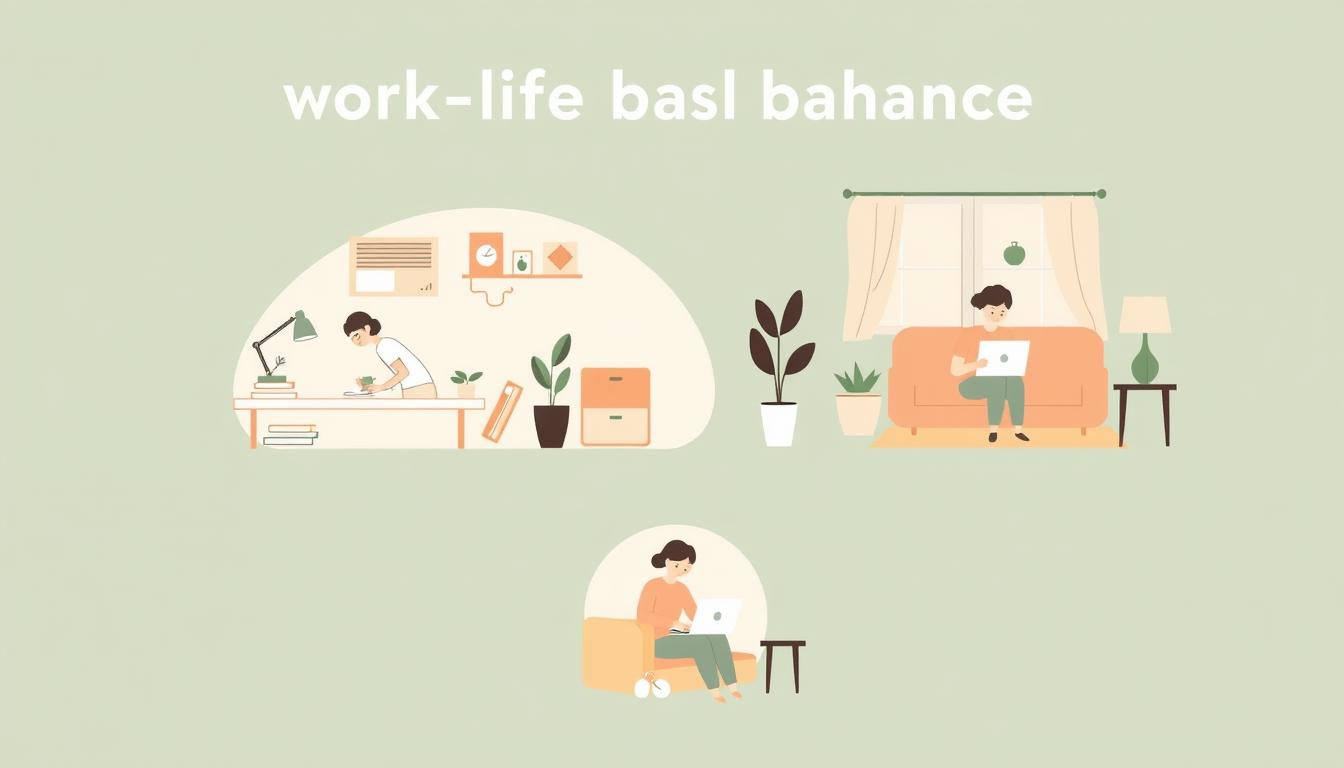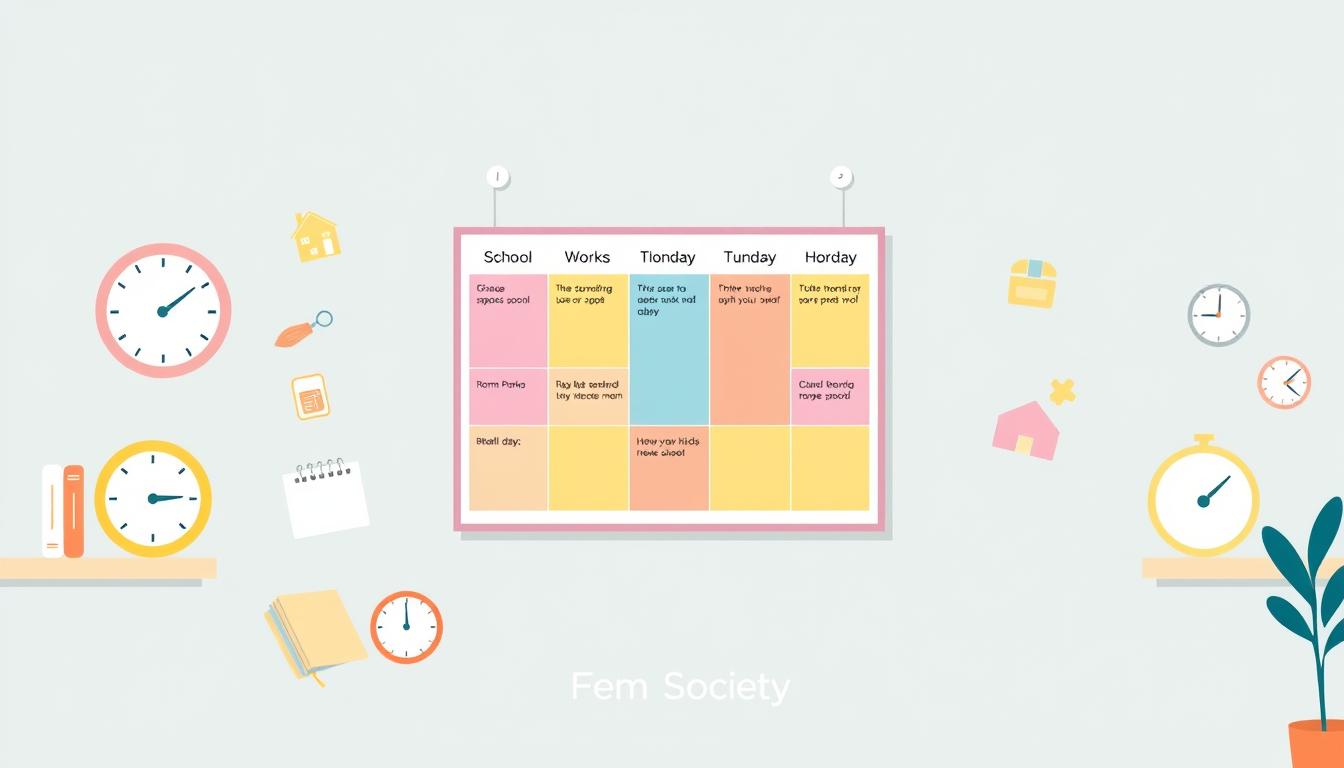Did you know 70% of college students in the United States work while studying? It’s tough to balance school, work, and home life. But, it’s key to do well in school and work. This guide will help you find a good balance in your life.

Key Takeaways
- Effective time management is crucial for juggling multiple responsibilities.
- Prioritizing self-care and mental well-being can enhance your productivity.
- Setting boundaries and learning to say no can prevent burnout.
- Leveraging technology and building a support network can streamline your daily tasks.
- Regularly reassessing your schedule and adjusting priorities can help you maintain a healthy balance.
Understanding the Importance of Work-School-Life Balance

Keeping work, school, and personal life in balance is key for your happiness. When things get out of balance, you might feel burned out. This can hurt your school work, your job, and your relationships.
This section talks about how balance helps your mind, school success, and career growth.
The Impact of Poor Balance on Mental Health
Not having enough time for everything can hurt your mind. A survey by the National Alliance on Mental Illness found 73% of college students feel stressed. Taking care of yourself, like exercising and sleeping, can help.
Why Balance Matters for Academic Success
Students who balance work and school do better in school. A U.S. Department of Education study showed students working 10-15 hours a week graduate 20% more than others. Good time management and focus help you succeed in school.
The Connection Between Personal and Professional Life
Your personal and work life are closely linked. Ignoring one can harm the other. U.S. Bureau of Labor Statistics data shows people with good work-life balance are 21% more engaged and 33% less stressed. A balanced life helps you do well in school and work.
Understanding the value of balance is the first step to a happy life. By focusing on your mind, school, and career, you open doors to growth.
Creating an Effective Time Management System

Managing school, work, and home can be tough. But, the right time management can help. It keeps you organized, productive, and focused. This balance is key to a healthy life.
First, sort your tasks by how urgent and important they are. Split big tasks into smaller ones. Use time-blocking to set times for each task. Digital planners like Asana or Trello can help you see your schedule.
- Use time management apps and digital tools to keep your schedule organized
- Prioritize tasks based on urgency and importance to avoid procrastination
- Break down big projects into smaller, more manageable steps
- Practice time-blocking to allocate dedicated time for specific tasks
It’s also important to take care of yourself. Schedule time for breaks, exercise, and mental well-being. This helps avoid burnout. Getting help from advisors or tutors can also help with challenges.
“Effective time management is not just about getting more done; it’s about creating a sustainable lifestyle that allows you to thrive in all areas of your life.” – Academic Advisor Colin Deyman
Building a good time management system takes time. Be patient and flexible. With the right strategies and tools, you can balance school, work, and home. This sets you up for success in all areas of your life.
How to Balance School and Work and Home Life

It’s hard to balance school, work, and home life. But it’s key for your happiness and success. If you ignore one area, stress and poor health can follow. Focus on what needs your attention and set goals you can reach.
The Domino Effect of Poor Balance
Ignoring balance can hurt a lot. Bad grades can harm your job chances and money. Too much work can hurt your family and mind. Keeping things balanced is key to avoid these problems.
Key Areas Requiring Attention
- Setting boundaries between work and family: It’s vital to keep work and home separate. Set work hours, don’t work when with family, and talk to everyone about your needs.
- Prioritizing family time over work: Work is important, but family comes first. Spend quality time with loved ones and be fully there.
- Effective communication in work-life balance: Talk openly with work, friends, and family. Share your schedule and needs to find solutions that work for everyone.
Setting Realistic Expectations
Be realistic about what you can do. Taking on too much can burn you out. Focus on what’s most important, share tasks, and say no when needed to keep balance.
| Key Statistic | Relevance |
|---|---|
| 53% of full-time students and 85% of part-time students work at least some of the time. | Shows many students juggle school and work, making balance strategies crucial. |
| One study found that a learner’s ability to adjust personally is a predictor of academic success. | Links personal well-being to success, showing the need for balance. |
| According to a study by the Kresge Foundation, the top two concerns for adult students pursuing their postsecondary degrees are taking on debt and balancing school with family obligations. | Points out major challenges for adult students, stressing the need for effective management. |
Developing a Strategic Study Schedule

As a student, balancing school, work, and personal life is key. Making a good study schedule helps you do well in school and feel good. It’s all about setting priorities and planning your time wisely.
Find out when you study best and plan your study times around that. Taking an online course can improve flexibility and time management. It lets you learn when it’s best for you. Don’t try to be perfect. Just make a study plan that works for you.
- Talk to your boss about working hours. This can help you manage school and work better.
- Get your family involved. They can offer great advice and help you stay on track.
- Make time for checking your progress. This keeps you on track and learning well.
Sticking to a schedule helps you balance work, school, and life. Change your schedule as needed. Stay focused and avoid distractions to manage your time well.
| Effective Scheduling Methods | Benefits |
|---|---|
| Asynchronous learning options and flexible start dates | Can assist in balancing work and study responsibilities |
| Participation in internships or part-time jobs related to the area of study | Can increase career growth opportunities |
| Engagement in networking events like conferences or seminars | Can enhance the development of professional connections |
| Involvement in online forums or social media groups relevant to the industry | Can augment networking endeavors |
| Acquisition of transferable skills like time management and communication abilities | Can improve academic performance and future employability |
By using these tips, you can work better, study well, and take care of yourself. You’ll find a great balance between school, work, and personal life.
Maximizing Productivity During Work Hours

Working and studying at the same time is hard. But, you can do well in both by using smart strategies. It’s all about talking well, managing tasks well, and using breaks right.
Effective Communication with Employers
Talk openly with your boss about your school plans. Share your class times and any work problems. Work together to find solutions, like changing your hours or working from home.
Your boss’s help can make a big difference in balancing work and school.
Managing Workplace Responsibilities
Sort your work tasks by how urgent and important they are. Use your skills to share tasks and finish projects on time. Keep track of deadlines and know what you need to do at work.
Utilizing Breaks Effectively
Breaks are key to staying focused and productive. Use them for self-care, like relaxing or going for a walk. Don’t study during breaks. It’s important to rest and refresh.
By using these tips, you can handle work and school well. Remember, managing time, talking clearly, and caring for yourself are important. They help you do your best during work hours.
Establishing a Dedicated Study Environment

Having a special place to study is key. It helps you stay focused, especially when you have school, work, and family to manage. A quiet spot lets you study better and do well in school.
To avoid distractions, pick a quiet spot in your home. Use headphones or machines to block out noise. Also, turn off your phone to stay away from social media.
Good posture is important for studying. Make sure your desk and chair are comfy. Use lights that don’t hurt your eyes and a desk lamp for extra light.
| Productivity Tip | Benefit |
|---|---|
| Invest in a comfortable, ergonomic chair | Reduces fatigue and improves focus during extended study sessions |
| Use natural lighting or a desk lamp with warm, soft illumination | Enhances mood and reduces eye strain |
| Incorporate calming scents, such as lavender or peppermint | Helps reduce stress and improve concentration |
Keeping your desk tidy is important. Only have what you need close by. Use shelves and files to keep things organized. This helps you stay focused.
Make your study area your own. Add things that inspire you. This makes you feel good and helps you study better.
By using these tips, you can make a great study space. It will help you reach your goals and keep your life balanced.
Maintaining Physical and Mental Well-being

As you deal with school, work, and personal life, taking care of yourself is key. It’s important to find a balance. This balance helps you stay productive, successful, and happy.
Sleep and Rest Priorities
Getting enough sleep and rest is crucial for your health. Try to sleep 7-9 hours each night. Make a bedtime routine and avoid screens before bed.
Also, make your bedroom a calm place. Take breaks during the day to rest and feel fresh again.
Exercise and Nutrition Goals
Regular exercise and a healthy diet boost your stress fighting skills and well-being. Find fun activities like walking, yoga, or gym workouts. Eat foods that give you energy and help your brain stay sharp.
Stress Management Techniques
Managing stress is vital for a good work-life balance. Try meditation, deep breathing, journaling, or listening to calm music. Doing things you love outside of work and school helps too.
Remember, taking care of your mind and body is essential for success. By focusing on self-care and healthy habits, you can handle life’s demands better.
“Taking care of your mind and body is one of the most important things you can do to achieve a healthy lifestyle balance.”
| Stress Management Strategies | Benefits |
|---|---|
| Meditation and Mindfulness | Reduces stress, improves focus, and enhances emotional regulation |
| Regular Exercise | Boosts mood, increases energy levels, and improves physical health |
| Proper Nutrition | Supports cognitive function, stabilizes mood, and promotes overall well-being |
| Leisure Activities | Provides a sense of joy, relaxation, and a much-needed break from work and study |
Leveraging Technology for Better Balance
As a working student, you have a lot to do. Technology can help you balance work, school, and life. It makes scheduling, managing tasks, and staying in touch easier.
Technology is great for talking and working together. Apps like Remind and BloomzApp help students and teachers talk more. They’re good for quick questions and feedback.
Platforms like Edmodo and Google Classroom make working together easier. They help students find class materials and talk with others around the world.
Tools like Padlet and Synth start conversations. They help students share ideas and learn from each other. They’re great for brainstorming and making presentations.
Infographic tools like Canva, Piktochart, Smore, and Visme make learning fun. They help students who like pictures and videos to do better in class.
Using these tools can make your life easier. You can do more things at once and work better with others. This helps you balance work and school as a working student.
Building a Support Network

It’s tough to balance school, work, and life. But you don’t have to face it by yourself. Having a strong support network is key to staying well and reaching your goals. This part will show you how to use family, friends, school help, and work mentors to get through tough times.
Family and Friends Support Systems
Your family and friends are very important. They can offer emotional, practical, and motivational help. Talk to them about your challenges and ask for help with things like cleaning or watching kids. Having people who support your goals is crucial.
Academic Resources
Your school has many resources to help you succeed. There are tutoring centers, writing labs, and advisors. Use these to get help with schoolwork, time management, or stress. Also, joining study groups can give you support from classmates.
Professional Mentorship
Look for mentors in your field who can guide you. They can share their experiences and help with balancing school, work, and life. These relationships can lead to new opportunities and help you grow in your career.
By using a wide support network, you can find the help you need for a good student life balance, working parent strategies, and school-work-life harmony. You don’t have to face this alone.
Setting Boundaries and Learning to Say No

It’s hard to balance school, work, and personal life. Learning to set clear boundaries and say no is key. This skill helps you focus on what’s important and keeps your mind healthy.
Creating routines and organizing your time helps a lot. But, setting boundaries is also crucial. It keeps your personal space safe and stops you from getting too tired.
- Identify your non-negotiables: Know what’s most important to you, like exercise, family time, or study.
- Communicate your limits: Tell your boss, teachers, and family about your free time and what you can do.
- Learn to say no: Say no to things that take too much of your time. Your well-being is more important than pleasing others.
Setting boundaries and saying no helps your mental health and boosts your productivity. You can live a better life by managing your time and energy well.
“The difference between successful people and really successful people is that really successful people say no to almost everything.” – Warren Buffett
Setting boundaries might feel hard at first. But it’s a step towards a better life. With time, you’ll handle your duties better and live a happier, less stressful life.
Organizing Household Responsibilities

It’s hard to balance school, work, and home life. But, managing home tasks well is key. By making routines, sharing tasks, and using smart tips, you can reduce stress. This lets you have more time for studying and taking care of yourself.
Creating Efficient Routines
Having a daily routine helps keep your home tidy. First, list the daily tasks like cooking, pet care, and cleaning. Pick times or days for each task. Get your family involved so everyone knows what to do.
Delegating Tasks
Sharing household duties among family members helps. See what your kids can do, like setting the table or folding laundry. This teaches them responsibility and gives you more time for studying and self-care.
Time-Saving Strategies
Using smart ways to do chores can save a lot of time. Plan meals and cook in bulk to save time on cooking. Use smart storage and declutter to make cleaning easier. If you can, hire a cleaner for deep cleaning.
By using these tips, you can keep a good balance in your life. It might take time to find the right balance, but it’s worth it.
| Household Task | Time Allotted | Responsible Family Member |
|---|---|---|
| Animal Care (before breakfast) | 30 minutes | Oldest Child |
| Dish Washing (after lunch and dinner) | 1 hour | Shared between Parents |
| Tidy-up (as dinner starts) | 30 minutes | Younger Children |
| Animal Care (after dinner) | 30 minutes | Middle Child |
“The key to balancing household responsibilities is embodied in not keeping score, recognizing the challenges of each other’s roles, playing to individual strengths, and delegating tasks efficiently within the family.”
Making Time for Self-Care and Personal Growth

Being a busy student can make it hard to take care of yourself. But, it’s key for success and happiness. By adding self-care to your day, you can feel better, work better, and enjoy life more.
Make time for things you love, like reading or drawing. These activities should be a must in your schedule. Experts say to plan your day with work, school, meals, and fun.
Good time management and sharing tasks can help too. Plan your day, keep lists short, and share chores. Kids can help with simple tasks or fun learning activities.
Self-care doesn’t have to be fancy. Simple things like breaks and a clean workspace help a lot. Nursing students, with their tough schedules, really need to take care of themselves.
Investing in yourself will make you better at school and work. It will also make life more enjoyable. Let self-care be your base for success.
“The greatest weapon against stress is our ability to choose one thought over another.” – William James
Preventing Burnout and Managing Stress
Work, school, and personal life can be tough to balance. This often leads to burnout and stress. But, with the right steps, you can avoid burnout and handle stress better.
It’s important to spot burnout signs early. The World Health Organization says burnout is feeling tired, unmotivated, and overwhelmed. Catching these signs early helps keep your life in balance and your mind healthy.
Setting clear limits and saying “no” when needed helps prevent burnout. This means having set work hours, not checking work emails at home, and taking time for yourself. Exercise, good sleep, and stress-reducing activities like meditation also help.
Managing your time well is key to avoiding burnout. This includes breaking tasks into smaller steps, planning your day, and sharing tasks with others. Checking and adjusting your schedule helps you stay on top of things.
Getting help from friends, family, or professionals is also crucial. Services like counseling offer personalized advice and techniques for staying well.
Preventing burnout and managing stress is a continuous effort. By being proactive, setting limits, and focusing on self-care, you can live a balanced life and succeed in all areas.
Managing Unexpected Challenges and Setbacks

School, work, and personal life can be hard to balance. Sometimes, unexpected challenges and setbacks happen. But, with the right mindset and strategies, you can get through them and keep your balance.
Emergency Planning
First, make an emergency plan. Think about things like natural disasters or personal emergencies. Having a plan helps keep your studies, work, and personal life on track.
Adapting to Change
Being flexible and adaptable is key when things change suddenly. Embrace a growth mindset to see challenges as chances to learn and grow. This way, you can handle changes better and keep your balance.
Recovery Strategies
Setbacks can be tough, but focus on recovery. Let yourself feel the emotions, then find lessons and ways to come back stronger. Support from friends, self-care, and staying positive help you recover and find balance again.
High school comes with unexpected challenges and setbacks. But, with the right mindset and strategies, you can handle them. Plan for emergencies, adapt to changes, and use recovery strategies. This way, you can keep your goal setting, time management techniques, and stress management tips on track.
“Setbacks are not stops, but stepping stones to greater growth and success.”
Learning to manage unexpected challenges and setbacks is a valuable skill. It helps in school, work, and life. Stay strong, flexible, and focused on your goals. With these strategies, you can overcome any obstacle.
Conclusion
Managing school, work, and home life is a big job. It needs dedication, flexibility, and knowing yourself well. We’ve looked at ways to help you manage your time and keep your life in balance.
Try the self-care habits, multitasking approaches, and organization tips we talked about. They can help you succeed in school and grow as a person. Use student life hacks to make the most of technology and your friends. And remember, it’s okay to prioritize your commitments to stay balanced.
The secret to balancing work, school, and life is to always think about yourself and change as needed. Stay strong, take care of yourself, and enjoy the journey. With hard work and smart planning, you can do well in every part of your life.
FAQ
Why is balancing school, work, and personal life crucial for success and well-being?
Balancing college, work, and personal life is tough but very important. It helps you avoid burnout and do better in school. It also helps you grow in your career and keep good relationships.
What are some effective time management strategies for balancing multiple responsibilities?
Good time management is key. Make a detailed schedule, focus on important tasks, and avoid putting things off. Break big tasks into smaller ones and use tools to stay organized.
How can I create a strategic study schedule while managing work and personal commitments?
A good study schedule is key for success. Plan your study time well, find your best work hours, and review regularly. Adjust your schedule for work and family needs.
What are some ways to maximize productivity at work when balancing multiple responsibilities?
Being productive at work is important. Talk well with your boss, manage tasks well, and focus on what’s most important. You can also delegate tasks and talk openly about your studies.
How can I create a dedicated study space to enhance focus and productivity?
A dedicated study space is crucial. Make your study area perfect, avoid distractions, and set boundaries. Good ergonomics and tools can also help a lot.
What are some self-care strategies for maintaining physical and mental well-being while juggling multiple commitments?
Taking care of yourself is key. Get enough sleep, exercise, and eat right. Use stress management and self-care to stay healthy and productive.
How can technology be used to help manage multiple commitments effectively?
Technology is very helpful. Use apps and tools to manage tasks and improve communication. But don’t let it distract you.
Why is it important to establish boundaries and learn to say no when balancing school, work, and personal life?
Setting boundaries and saying no is very important. Prioritize, communicate your limits, and say no to things that are not essential. This keeps your life balanced.
How can I efficiently manage household responsibilities while balancing multiple commitments?
Managing home tasks is important. Create routines, share tasks with family, and find quick ways to do chores. Kids can help too, and meal planning can reduce stress.
What strategies can I use to prevent burnout and manage stress while balancing school, work, and personal life?
Avoiding burnout and stress is crucial. Watch for signs of burnout, use stress-reduction methods, and stay strong. Regularly check how you’re doing and adjust as needed.